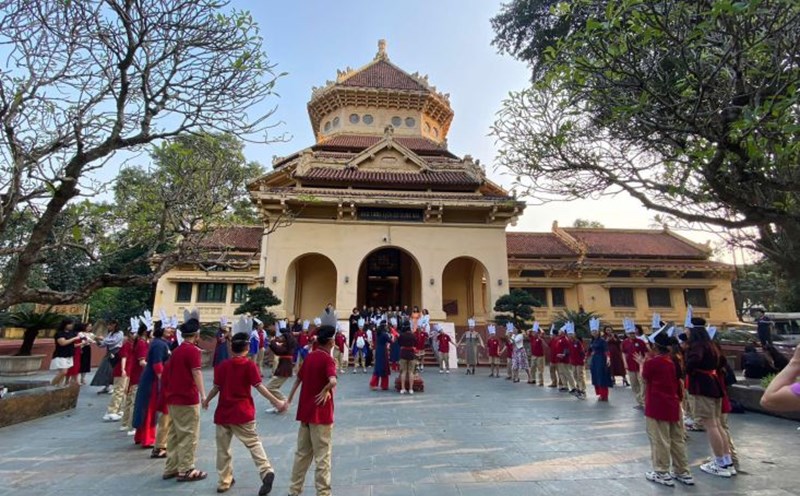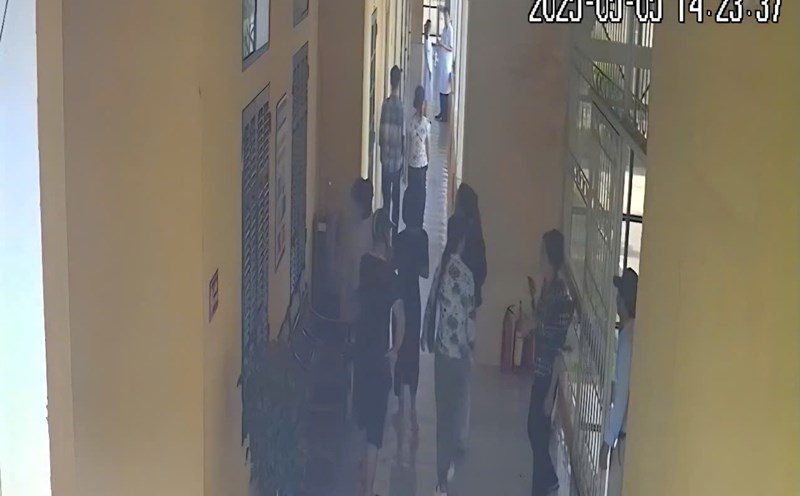From the "fever" of historical museums...
In the last days of 2024, public opinion was stirred by the "fever" of the Vietnam Military History Museum. In less than a month since its opening, the museum has welcomed more than 300,000 visitors. On peak days, it welcomes about 30,000 - 40,000 visitors, especially on weekends, it can increase to 60,000 visitors/day. The Military History Museum attracts a large number of young people, creating unprecedented records.
Pham Anh Duc - a second-year student at the Diplomatic Academy, visited the Vietnam Military History Museum with excitement.
“I am impressed with the artifacts here. The layout is very modern and youthful, making it easy for young people to absorb information. What impresses me more is that the museum attracts a lot of young people, especially students of all levels,” Duc said.
The young student believes that this shows that the way history is studied by the current generation of students has changed positively, it is no longer simply learning through books and lectures in class. This way of learning will help students have a more intuitive view and better understand Vietnamese history through the periods.
Not only the Vietnam Military History Museum, in recent years, the museum industry has increasingly attracted a large number of students, university students, and young people to visit and study.
According to statistics, the Vietnam Museum of Ethnology welcomes nearly half a million visitors each year. It is estimated that this unit usually welcomes 1,000 - 2,000 visitors on weekends. In particular, on holidays or events, the museum can welcome 10,000 - 15,000 visitors in 2 weekends.
In localities, the attraction of museums has not cooled down. For example, in Binh Thuan, in 2024, the provincial museum welcomed and served more than 211,000 visitors to visit, study, research, and experience, reaching 124%.
Schools also incorporate activities and field trips into their annual plans, thereby "connecting" the past, present and future, bringing history closer to learners.
“The school always tries to promote history education and propaganda for students through practical activities so that students will remember and understand history faster, and arouse their love for the subject in the most natural way,” shared Ms. Ha Thi Quynh, Principal of Quang Vinh Primary School (Thai Nguyen).

..to innovate teaching and learning thinking
Mr. Nguyen Quoc Binh - Principal of Luong The Vinh Secondary and High School (Hanoi) said that taking students to visit, experience and learn at museums in general is not a new teaching method but has been applied effectively in many countries.
In Vietnam, this is completely feasible when there are many museums and relic sites with great historical and cultural values. In particular, according to the 2018 general education program, experiential activities are included as a subject in the main curriculum, opening up a new direction for schools.
From the impressive numbers of visitors to historical museums in recent times, Mr. Binh expressed his hope that this will not be a temporary trend, but that visitors, especially young people, will come to museums with the desire to explore, learn more, and understand more about the history of building and defending the nation.
“Not only the Vietnam Military History Museum or history studies alone, to make learning and practical experiences effective, what needs to be done is more than just trips. Specifically for History, with museum visits, teachers need to assign tasks and guide students in their learning content, so that they can draw conclusions and lessons after the trip. At the same time, to help students gain in-depth understanding, schools need to focus on specific, clear topics; avoid scattered, superficial visits. To do that, teachers need to be well-prepared and have meticulous plans,” Mr. Binh expressed his opinion.
Speaking more about the teaching of history in Vietnam today, Mr. Binh said that History is an important subject. Fostering a love of history in students is the responsibility of teachers, schools, the entire education sector and society.
“Our country’s history is rich, fascinating and has many things to exploit, but our history teaching methods are still monotonous, poor, and unattractive; focusing on theory and numbers... without highlighting the values of historical events. The new program has shown many positive signs, and the current history teaching has also undergone some innovations, but they are still slow. Innovation requires a long journey. I really look forward to stronger and more drastic changes in the education and training sector to help students love people and their country more, thereby being responsible for the country...” - Mr. Nguyen Quoc Binh emphasized.











